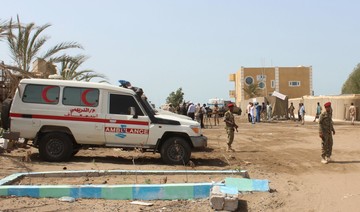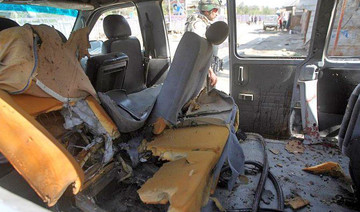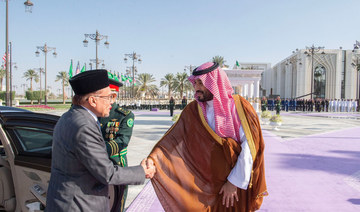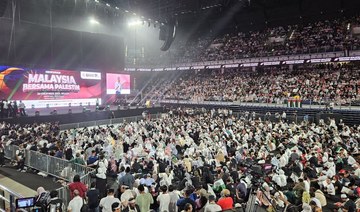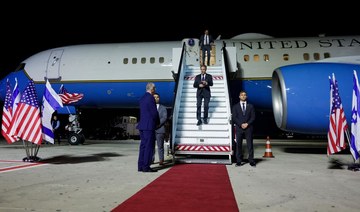TEHRAN: The halls of the former prison in the heart of Iran's capital now are hushed, befitting the sounds of the museum that it has become. Wax mannequins silently portray the horrific acts of torture that once were carried out within its walls.
But the surviving inmates still remember the screams.
Exhibits in the former Anti-Sabotage Joint Committee Prison that was run under Shah Mohammad Reza Pahlavi include a frightened man trapped in a small metal cage as a cigarette-smoking interrogator shouts above him.
In a circular courtyard, a snarling interrogator is depicted forcing a prisoner's head under water while another inmate above hangs from his wrists.
As Iran this month marks the 40th anniversary of its Islamic Revolution and the overthrow of the shah, the surviving inmates who suffered torture at the hands of the country's police and dreaded SAVAK intelligence service still bear both visible and hidden scars. Even today, United Nations investigators and rights group say Iran tortures and arbitrarily detains prisoners.
"We are far from where we must be as far as the justice is concerned," said Ahmad Sheikhi, a 63-year-old former revolutionary once tortured at the prison. "Justice has yet to be spread in the society, and we are definitely very far from the sacred goals of the martyrs and their imam," Ayatollah Ruhollah Khomeini.
The SAVAK, a Farsi acronym for the Organization of Intelligence and Security of the Nation, was formed in 1957. The agency, created with the help of the CIA and Israel's Mossad, initially targeted communists and leftists in the wake of the 1953 CIA-backed coup that overthrew elected Prime Minister Mohammed Mosaddegh.
Over time, however, its scope was widened drastically. Torture became widespread, as shown in the museum's exhibits. Interrogators all wear ties, a nod to their Western connections. Portraits of the shah, Queen Farah and his son, Crown Prince Reza Pahlavi, who now lives in exile in the US, hang above one torture scene.
"Following the coup, the shah's regime sank into a legitimacy crisis and it failed to get rid of the crisis until the end of its life," said Hashem Aghajari, who teaches history at Tehran's Tarbiat Modares University. "The coup mobilized all progressive political forces against the regime."
Sheikhi walked with Associated Press journalists through the prison that once held him, built in the 1930s by German engineers. Black-and-white photographs of its 8,500 prisoners from over the years line the walls. They include current Supreme Leader Ayatollah Ali Khamenei and the late President Akbar Hashemi Rafsanjani.
Sheikhi, then 19, spent about three months in the prison and 11 months in another after being detained for distributing anti-shah statements from Khomeini, then in exile.
"Four times I was tortured in two consecutive days, every time about 10 minutes," he recounted. "They used electric cables and wires for flogging my (feet) while I was blindfolded. The first hit was very effective; you felt your heart and brain were exploding."
Even more frightening was the torture device interrogators and prisoners referred to as the Apollo, named after the US lunar program. Those tortured sat in a chair and had a metal bucket strapped over their head, like a space helmet, that intensified their screams.
"They put my fingers and toes between the jaws of the vises firmly, whipped the soles of my feet with cables and put a metal bucket over head," Sheikhi said. "My own cries would twirl around inside the bucket and made me delirious and gave me headaches. They would hit the bucket with those cables as well."
Ezzat Shahi, another former prisoner who planted bombs targeting state buildings, recounted having pins hammered under his nails that would be heated by candles.
"Hanging from the wrists while your hands were handcuffed crossed behind was the most intolerable torture," Shahi said.
The horror of the torture shocked 20-year-old museumgoer Ameneh Khavari.
"I did not know that the torture might have been this agonizing, such as with the metal cage torture device," she said. "I had known that there was torture then from movies about the pre-revolution times, but would not have imagined that they looked like this."
As the revolution took hold, protesters overran the prison. Then Iran's Islamic government began using it as a prison as well, calling it Tohid. Human Rights Watch has accused Iran of using both Tohid and Evin prisons for detaining political prisoners. Tohid, then run by Iran's Intelligence Ministry, closed in 2000 under reformist President Mohammad Khatami after lawmakers sought to close prisons not under the control of the judiciary.
Today, Iran's government faces widespread international criticism from the UN and others over its detention of activists and those with ties to the West.
"Iranian authorities use vaguely worded and overly broad national security-related charges to criminalize peaceful or legitimate activities in defense of human rights," according to a report released in March 2018 by the office of the UN's special rapporteur on human rights in Iran.
Iran has criticized the UN's creation of the special rapporteur's position and called its findings "psychological and propagandist pressures."
A series of Westerners, including Washington Post journalist Jason Rezaian, were held at Evin Prison. Rezaian is suing Iran in US federal court over his detention, alleging he faced such "physical mistreatment and severe psychological abuse in Evin Prison that he will never be the same."
Since the revolution, several former prisons from the shah's time have closed, becoming museums and shopping malls, although new ones were built. A former mayor of Tehran even planned to make Evin Prison a park at one point. Funding never came through, however, and the site remains a prison today.
Torture still scars Iranians 40 years after revolution
Torture still scars Iranians 40 years after revolution

- The surviving inmates who suffered torture at the hands of the country's police and dreaded SAVAK intelligence service still bear both visible and hidden scars
- SAVAK, created with the help of the CIA and Israel's Mossad, initially targeted communists and leftists in the wake of the 1953 CIA-backed coup that overthrew elected Prime Minister Mohammed Mosaddegh
Houthis claim Red Sea victory against US Navy

- Militia forces lack technical or military capability to achieve their objectives in the Mediterranean, analyst says
AL-MUKALLA: The Houthis have reiterated a warning of strikes against ships bound for or with links to Israel — including those in the Mediterranean — as they claimed victory against the US Navy in the Red Sea.
The Houthi-controlled SABA news agency reported that the fourth phase of the militia’s pro-Palestine campaign would involve targeting all ships en route to Israel that came within range of their drones and missiles, noting that the US, UK, and other Western navies “stood helpless” in the face of their attacks.
“The fourth phase demonstrates the striking strength of the Yemeni armed forces in battling the world’s most potent naval weaponry, the American, British and European fleets, as well as the Zionist (Israel) navy,” SABA said.
Houthi military spokesman Yahya Sarea said on Friday strikes against Israel-linked ships would be expanded to the Mediterranean. Attacks would be escalated to include any companies interacting with Israel if the country carried out its planned attack on the Palestinian Rafah.
Since November, the Houthis have launched hundreds of ballistic missiles and drones at commercial and navy vessels in the Red Sea, Bab Al-Mandab Strait and the Gulf of Aden. They claim attacks are only aimed at ships linked with Israel in a bid to force an end to its siege on the Gaza Strip.
They have also fired at US and UK commercial and navy ships in international waters off Yemen after the two countries launched strikes against Houthi-controlled areas.
On Saturday, Houthi information minister Dhaif Allah Al-Shami claimed the US was forced to withdraw its aircraft carrier and other naval ships from the Red Sea after failing to counteract attacks. He added new offensives would begin against Israeli ships in the Mediterranean in the coming days.
“They failed badly. Yemeni missiles and drones beat the US Navy, and its military, cruisers, destroyers and aircraft carriers started to retreat from our seas,” Al-Shami said in an interview with Lebanon’s Al-Mayadeen TV news channel.
Yemen specialists have disputed Houthi assertions that they have military weapons capable of reaching Israeli ships in the Mediterranean.
Brig. Gen. Mohammed Al-Kumaim, a Yemeni military analyst, told Arab News on Sunday the Houthis would only be able to carry out such attacks if they had advanced weaponry. He said the Houthis were expanding their campaign against ships to avoid growing public resentment in areas under their control after the militia had failed to pay public employees and repair services.
Al-Kumaim added the Houthis might claim responsibility for an attack on a ship in the Mediterranean which was carried out by an Iran-backed group operating in the region.
“Theoretically and technologically, the Houthis lack any technical or military capability to achieve their objectives (in the Mediterranean),” Al-Kumaim said.
Jordanian-Iraqi economic forum begins at Dead Sea resort

- A specialized session will focus on investment prospects in various economic sectors
AMMAN: Jordanian Minister of Investment Kholoud Saqqaf opened the Economic Forum for Financial, Industrial, and Commercial Partnerships between Iraq and Jordan on Sunday.
The forum, which is organized jointly by the Iraqi Business Council in collaboration with the Jordan and Amman chambers of industry, aims to strengthen economic ties between the two countries.
Held at the King Hussein Convention Center on the shores of the Dead Sea, the forum is the largest regional gathering for fostering economic cooperation between Jordan and Iraq, Jordan News Agency reported.
Over two days, the event will promote regional integration by facilitating economic connectivity and encourage collaboration across sectors.
Discussions will cover investment opportunities in Jordan and Iraq, prospects for commercial and industrial ventures, economic modernization initiatives, and opportunities in Jordan’s free and development zones.
Key figures attending include Kamel Dulaimi, the Iraq president’s chief of staff, ministers from Jordan and Iraq, as well as business leaders, investors and representatives from Arab and foreign companies.
Discussions are expected to focus on the banking sector’s role in providing financial support, while highlighting success stories from investment companies in both countries.
A specialized session will focus on investment prospects in various economic sectors, with a particular emphasis on mining and industry.
At the opening, Saqqaf highlighted investment prospects displayed on the Invest in Jordan platform, which align with the kingdom’s Economic Modernization Vision.
Meanwhile, Iraqi Minister of Industry and Mineral Resources Khaled Battal Al-Najm drew attention to his country’s industrial strategy and plans for a joint economic zone with Jordan, alongside efforts to address unemployment and attract foreign investment, especially in mining.
Dulaimi emphasized the significance of Iraqi President Abdul Latif Rashid’s recent visit to Jordan, underscoring discussions aimed at strengthening ties and enhancing economic systems to facilitate investment projects.
UAE delivers 400 tonnes of food aid to Gaza
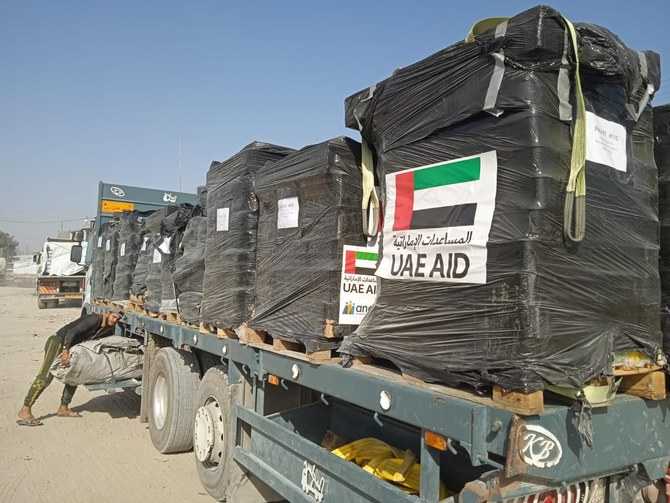
- Delivery, specifically for the northern areas of the enclave, is enough to feed about 120,000 people
DUBAI: The UAE, in partnership with American Near East Refugee Aid, announced on Sunday that it had delivered 400 tonnes of food aid to Gaza.
The delivery, specifically for the northern areas of the enclave, is enough to feed about 120,000 people, Emirates News Agency reported.
Reem Al-Hashimy, Emirati minister of state for international cooperation, said: “The UAE’s safe and successful delivery and distribution of food relief to the Gaza Strip, especially the northern Gaza Strip, marks a significant scaling up in action.”
She continued: “We remain firmly committed to our position of solidarity with the brotherly Palestinian people and alleviating suffering in the Gaza Strip. The UAE, working in parallel with international partners, is determined more than ever to intensify all efforts to ensure that aid lifelines get to those who need it the most.”
Sean Carroll, CEO of ANERA, thanked the Emirati government for its assistance in getting the much-needed aid to the Palestinian people.
“ANERA and the people we serve are extremely grateful for support from the government and people of the UAE, that allows us to deliver this food to northern Gaza, where the needs are so great,” he said.
Last month the UAE allocated $15 million under Cyprus’s Amalthea Fund to bolster aid efforts in Gaza.
Meanwhile, the Gulf country continues to collaborate with international partners and organizations to enable the effective delivery of food and relief via land, air and sea.
To date, the UAE has dispatched more than 31,000 tonnes of humanitarian supplies, including food, relief items and medical supplies, using 256 flights, 46 airdrops, 1,231 trucks, and six ships.
The UAE has embarked on several sustainable relief projects to ensure a consistent supply of food and water to the people of Gaza.
These initiatives include the establishment of five automatic bakeries, the provision of flour to eight existing bakeries, and the installation of six desalination plants with a combined capacity of 1.2 million gallons of water a day.
Malaysian PM condemns West’s ‘sheer hypocrisy’ over Gaza war

- Anwar Ibrahim spoke on a wide range of topics in interview during recent visit to Riyadh
- He pointed out Malaysia had “issued statements to demand that the Gaza genocide must end”
DUBAI: Malaysia takes a strong stance on the war in Gaza and condemns the “sheer hypocrisy” of Western countries over the ongoing Israeli killing of Palestinian women and children, Prime Minister Anwar Ibrahim has said.
Speaking to Katie Jensen, host of the Arab News current affairs program “Frankly Speaking,” during a visit to Riyadh for a special meeting of the World Economic Forum last week, he said that a failure to prevent genocide in Gaza could foster extremism.
“We have issued statements to suggest that their genocide must end,” Anwar said in an interview that can be read in full on page 3.
“And it’s sheer hypocrisy for countries, some countries in the West, including the United States, to deny these continued killings of children and women and civilians.
“Whatever your political position is, I don’t believe that in this period we can condone these sort of inhuman, barbaric acts against fellow human beings. And I think that position is clear. Our position is very strong in that direction.
“I know for an emerging, developing country, it may sound a bit too harsh, but then how do you condone continued killings of women and children? There’s no other way except to at least express in the very strongest terms possible.
“I appreciate the role of the Arab neighbors and Turkiye and Iran and all these other countries trying to do their part. And I think we in Malaysia and many other countries outside the region, too, are expressing gross concern because people are feeling enraged.
“And we don’t want this to prolong, because it will only lead to groups to foster fanatical extremist or terrorist action in the absence of the failure of the international community.”
According to recent reports, the prosecutor of the International Criminal Court may soon issue warrants for the arrest of Israeli Prime Minister Benjamin Netanyahu and Defense Minister Yoav Gallant on charges of deliberately starving Palestinians in Gaza.
If the ICC rules that genocide is taking place in Gaza, Anwar said he would support calls for the arrest of the Israeli ministers.
“I don’t believe that any reasonable person could dispute the incontrovertible effects adduced to support their allegation that genocide has been committed,” he said. “Once it is established that genocide happened, then of course the warrants have to be issued.”
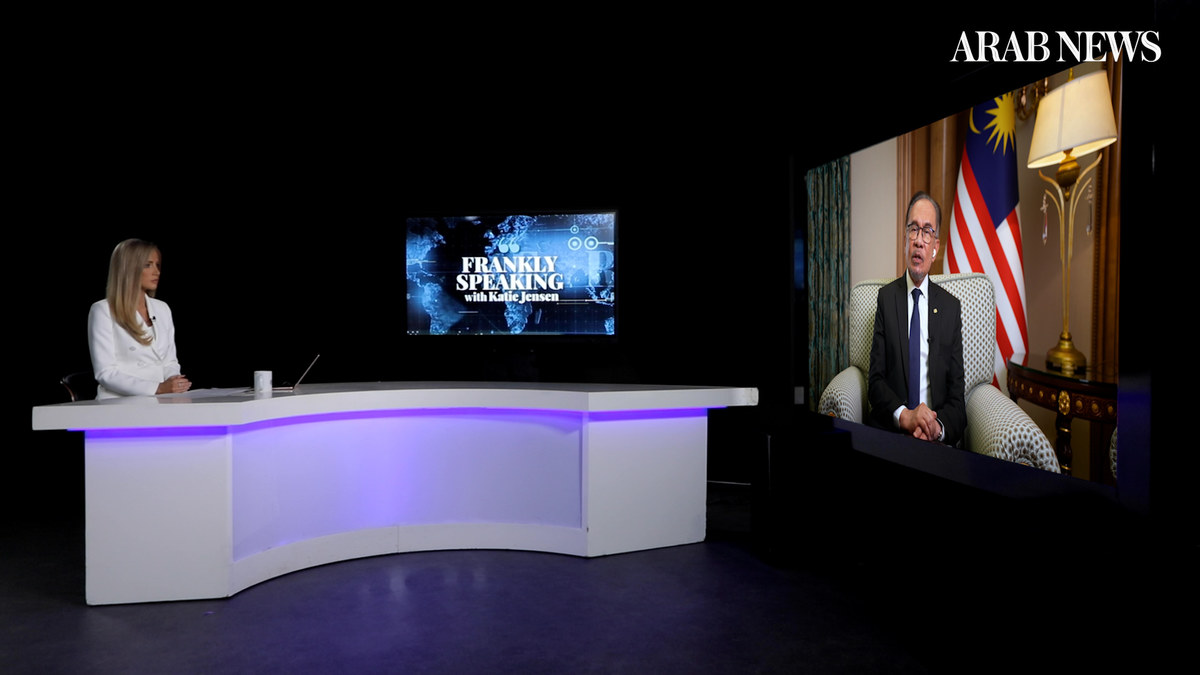
In Kuala Lumpur, a trial is currently taking place after an Israeli national was arrested on March 28 suspected of entering Malaysia to assassinate a compatriot. He was found in possession of six guns and some 200 rounds of ammunition.
The case has raised speculation as to whether the man, named by local authorities as Shalom Avitan, was in fact a spy.
Asked whether any proof had been found connecting the Israeli national to espionage or organized crime, Anwar said investigations were ongoing.
“They have not established the fact that whether this criminal is a spy, but certainly the actions, the movements, the amount of weapons and the link networking within the country is of course concerning,” he said.
“And the authorities are taking tough measures to make sure they get to the bottom of it.”
On whether an independent Palestinian state is likely to come to fruition this year from the ashes of the Gaza war, Anwar said no country — including the US — has the right to deny the resounding global support for Palestinian statehood.
“There are 139 countries that have given recognition to the state of Palestine,” he said. “Now, why must one or two countries consider them above all these considerations and refuse to accept this?
“And to my mind, it is dishonorable to deny the right, not only of Palestinians but of the international community when they decide after years or decades of deliberations, looking at the facts, looking at historical decisions, looking at the precarious position now on the issue of security of the region, issue of economic progress.
“After all these considerations, 139 say, yes, we must recognize the existence of the state of Palestine. I don’t believe any country has the right to deny the sentiments, aspirations of the world.”
Netanyahu says ending Gaza war now would keep Hamas in power
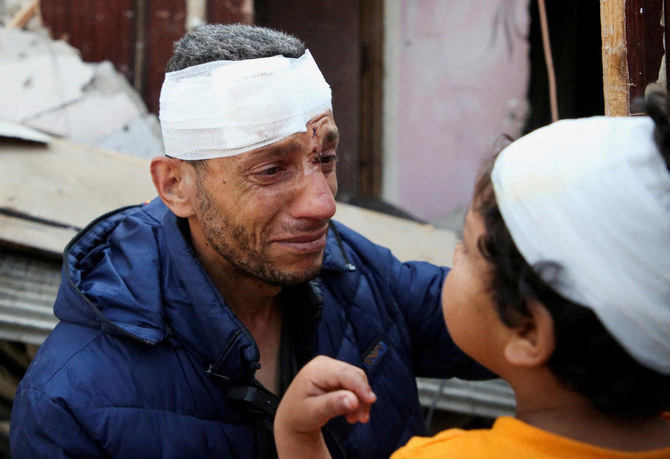
- Israeli leader hardens his rejection of Hamas demands for an end to the Gaza war in exchange for the freeing of hostages
JERUSALEM: Prime Minister Benjamin Netanyahu hardened his rejection of Hamas demands for an end to the Gaza war in exchange for the freeing of hostages, saying on Sunday that would keep the Palestinian Islamist group in power and pose a threat to Israel.
Netanyahu said Israel was willing to pause fighting in Gaza in order to secure the release of hostages still being held by Hamas, believed to number more than 130.
“But while Israel has shown willingness, Hamas remains entrenched in its extreme positions, first among them the demand to remove all our forces from the Gaza Strip, end the war, and leave Hamas in power,” Netanyahu said.
“Israel cannot accept that.”
“Hamas would be able to achieve its promise of carrying out again and again and again its massacres, rapes and kidnapping.”
In Cairo, Hamas leaders held a second day of truce talks with Egyptian and Qatari mediators, with no apparent progress reported as the group maintained its demand that any agreement must end the war in Gaza, Palestinian officials said.
The war began after an assault by Hamas on southern Israel on Oct. 7 in which 1,200 people were killed and 252 hostages taken, according to Israeli tallies.
Israel’s ensuring military offensive has killed more than 34,600 Palestinians, according to the health ministry in the Hamas-ruled Gaza. The bombardment has devastated much of the coastal enclave and caused a humanitarian crisis.


